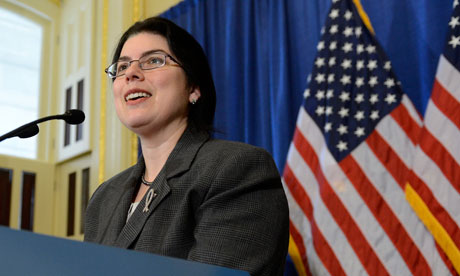
Navy veteran Ruth Moore: 'I fought for nearly 25 years to get the benefits I was owed'. Photograph: Michael Reynolds/EPA
Ruth Moore, a US navy veteran from Milbridge, Maine, was 18 and eager to serve her country on her first oversees assignment when she was raped by her supervisor, twice. Her ordeal, and the military's refusal to address it, left her so traumatised she attempted suicide, after which she was discharged, diagnosed with a personality disorder she says she did not have.
Moore, now 44, has since spent a quarter of a century fighting for compensation from the Veterans Administration before finally being diagnosed with PTSD related to the attacks. She is far from alone, according to two lawmakers who, on Wednesday, introduced a bill named after her that requires the VA to fix its "unfair and broken" disability claim system for victims of sexual military assault.
Under current regulations, veterans like Moore whose mental health issues are connected to sexual violence face a far greater burden of proof than other claimants suffering from the same illnesses. Yet, according to the Service Woman's Action Network (Swan), military sexual trauma is the leading cause of PTSD among female veterans.
"I fought for nearly 25 years to get the benefits I was owed" Moore said. "My records were tampered with, I was diagnosed with a mental illness I didn't have, and my life fell apart."
During the attack, she contracted a sexually transmitted disease which made it difficult for her to conceive, and years later she suffered miscarriages, although she is now a mother. Her undiagnosed PTSD made employment difficult, and she lost her home. But her lowest point came when the VA refused to help, she said.
"The trauma was severe after the attack but over the years constantly being made to seek help and talk about and relieve it made it worse." she said. "The lowest point is being denied by the VA" she said. "You have no support."
"Survivors don't know what to do. They are so full of anger and shame and pain, and there's no one to help them," said Moore.
Welcoming the bill, proposed a day after President Barack Obama promised in his state of the union address to continue improving healthcare for veterans, Moore said what happened to her "shouldn't have to happen to anyone, and this bill will make it a little easier for veterans who deserve some compensation".
One in three service women report having been sexually assaulted, according to the Defense Department. In 2010, the latest year for which data is available, the Pentagon estimated that some 19,000 assaults occurred. Among those who have been in active combat, the number is even greater ? almost half of women sent to Iraq and Afghanistan report being sexually harassed, with a quarter reporting sexual assault, according to a report last year by the VA.
In a press statement, senator Jon Tester, of Montana, a Democratic member of the Veterans Affairs Committee who proposed the Ruth Moore Act of 2013, said: "We have a responsibility to meet the needs of all victims of service-related trauma. This legislation is simply a matter of fairness to make sure that survivors of military sexual assault get the support they deserve without having to jump through additional hoops."
Chellie Pingree, a Democratic representative from Maine and the bill's sponsor in the House, said: "It's outrageous that men and women who sign up to defend our country end up being victims of sexual assault in the first place. Then to deny them the help they need to recover is simply unacceptable.
"It's very difficult to prove sexual assault within the current system, which makes it just as difficult for veterans who have been victims to qualify for the treatments and benefits they need to recover. It's a classic case of adding insult to injury."
Only 8% of assault allegations are ever prosecuted, according to the Pentagon.
Anu Bhagwati, executive director of Service Women's Action Network and a former marine corps captain who helped propose the bill, said: "Survivors of military sexual assault and sexual harassment are betrayed twice: first by the military who all too often fails to support the victim; and by the VA which has for years systematically rejected MST disability claims based on this unequal and unfair regulation."
At a hearing before Congress last year, where Moore testified about her experiences, California Democrat Jackie Spier said that when victims reported sexual abuse they were often diagnosed with personality disorders and phased out of the military.
Moore began a petition on Change.org for the VA to alter its policy last July. It now has over 150,000 signatures and 15,000 comments from victims of military sexual abuse which "moved me to tears" she said.
Source: http://www.guardian.co.uk/world/2013/feb/13/us-military-rape-victims-bill
iOS 6 Release Date Canelo Alvarez Chavez vs Martinez Yunel Escobar Irish Daily Star seth macfarlane Black Mesa
No comments:
Post a Comment